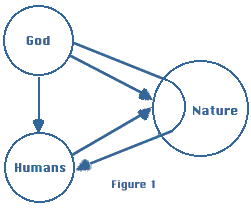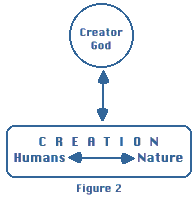
The Environment, Ecology, and the Bible
Ronald A. Simkins
Assistant Professor of Theology
No longer can God proclaim that the creation is good, for humankind has polluted the heavens and the earth. As citizens of planet Earth, we are facing an environmental crisis of our own making. We have polluted large portions of our planetary home; we have depleted many of its natural resources; we have even begun to destroy the atmosphere that protects us from harmful solar radiation and to alter the climate and the soil on which we are dependent for the cultivation of our food. We are slowly but inevitably undermining the earth’s ability to sustain human life. Although the extent of the environmental crisis is often debated, few would question its existence. Can the Bible make a contribution toward resolution of this environmental crisis? The common wisdom answers resolutely, "No!"
The Bible has been rejected as a viable voice in the environmental discussions because many ecologically concerned Christians–especially theologians–believe that the Bible offers no insights for resolving our present crisis. Others even assert that the Bible itself has contributed to the environmental crisis. In a frequently published essay entitled "The Historical Roots of Our Ecologic Crisis" (1967), Lynn White argued that modern technology and science, the means by which we exploit the natural environment, can be traced ultimately to the biblical religion. He claimed that the religion of the Bible, with its idea of linear history and perpetual progress, disenchanted the natural world. Nature was transformed from a subject to be revered to an object to be used. The biblical religion made it possible "to exploit nature in a mood of indifference to the feelings of natural objects." White concluded that, according to the biblical text, "it is God’s will that man [sic] exploit nature for his proper ends."
Despite the popularity and influence of White’s essay, there has been no shortage of biblical scholars who have defended the Bible against his charges. Whereas White argued that the Bible advocates a despotic role for humans in relation to the natural world, biblical scholars have claimed that the Bible more accurately promotes a stewardship model for understanding the human relationship to nature: Rather than exploit nature, humans are commissioned to care for the natural world. Biblical scholars, however, were unable to redeem the Bible for the use in environmental discussions. Because they were unable to divorce their interpretation of the biblical text from the ecology they presumed was implicit in the text, their ideal stewards turned out to be little more than benevolent despots.
Prior to the controversy generated by White’s essay, biblical scholars largely ignored the Bible’s view of the natural world; instead, they emphasized God’s activity in and on behalf of human history. According to this interpretation, the Bible is concerned exclusively with human salvation: God acts in human history in judgment and in deliverance in order to guide that history towards its final consummation when God’s people will be redeemed. As for the natural world, biblical scholars considered it to be merely the stage for the historical drama; it served as a passive instrument which God could utilize in the actualization of history’s divine plan.
A long-lasting effect of biblical scholarship’s use of the history-versus-nature model for interpreting the biblical religion has been the presumption of a particular, though implicit, ecology along these dichotomous lines. The implicit ecology of the Bible, which scholars had presumed in their use of this model, ascribed no active role to the natural world. As diagrammed in figure 1, nature was perceived simply as raw material. It was the product of God’s creation, and as such could serve as God’s instrument to affect humankind. But it had no independent power to effect change. Humans could also affect the natural world. Acting as God’s representatives in this world, they could utilize nature’s resources for their own purposes. The natural world was subject to both divine and human control.
Although biblical scholars interpreted what they had presumed to be the biblical ecology in a positive light because it freed Israel for history, White correctly recognized that this ecology is detrimental to the health of the earth. It promotes an ethic of exploitation. Humans are privileged to use the earth and its resources as they see fit. Although this ecology can be tempered by the ideal of stewardship, it ascribes no intrinsic worth or necessary role to the natural world. As a result, there is no motivation for an environmentally healthy stewardship: Humans have the right to use nature as they decide. The effect they have on the natural world is inconsequential, for nature has no independent value. It is given value only in relation to human actions and desires.
This adverse ecology, however, is not the implicit ecology of the Bible. Scholars have simply presumed it (undoubtedly because it is the dominant ecology of individuals in the western world) in their interpretation of the Bible. The result has been an ethnocentric understanding of the Bible’s view of the natural world. In contrast to this presumed ecology, an investigation of the Bible with the aim of discerning the Bible’s implicit ecology, a task that has been largely neglected by biblical scholars, reveals an ecology that is reflective of an organismic model.
The biblical creation myths and metaphors hold the key to discovering the biblical ecology. Because these myths and metaphors articulate the triangular relationship between God, humankind, and the natural world, they make explicit the implicit ecology of the Bible. As illustrated in figure 2, this ecology recognizes a correlation between humankind and the natural world. Although humans are part of nature, created along with the rest of the natural world, they are also distinct from nature, singled out as different in kind. We refer to this distinction as culture, the ability of humans to create their own, artificial environment that is superimposed on the natural world. The biblical writers attributed this distinction to the human character: Humans were created distinct from the rest of the natural world; they were created in the "image of God." Nevertheless, the ecology of the Bible is not defined in terms of a dichotomy between nature and culture. Rather, humankind is one in substance with the natural world. Together as the creation they stand in dependent relationship to God their creator. Humans are integrally connected to the natural world despite their cultural attempts to transcend it.
natural world, they make explicit the implicit ecology of the Bible. As illustrated in figure 2, this ecology recognizes a correlation between humankind and the natural world. Although humans are part of nature, created along with the rest of the natural world, they are also distinct from nature, singled out as different in kind. We refer to this distinction as culture, the ability of humans to create their own, artificial environment that is superimposed on the natural world. The biblical writers attributed this distinction to the human character: Humans were created distinct from the rest of the natural world; they were created in the "image of God." Nevertheless, the ecology of the Bible is not defined in terms of a dichotomy between nature and culture. Rather, humankind is one in substance with the natural world. Together as the creation they stand in dependent relationship to God their creator. Humans are integrally connected to the natural world despite their cultural attempts to transcend it.
When the Bible is read from the perspective of its own implicit ecology, it can make a valuable contribution toward alleviating the current environmental crisis. The Bible can challenge the basic values of all those who would deny intrinsic worth to the natural world. Nature is the creation of God, and thus is able to praise and reveal God. Moreover, because humans are organically related to their natural environment, the fates of humankind and the natural world are inseparably bound together. Human sin corrupts the natural world, and the redemption of humankind is not possible apart from the redemption of nature. The creation is complete only when humans and nature are in right relation to each other and to God.